#ontology
Text
There is a long long conversation that I want to participate in and highlight about race and the Palestinian liberation struggle because 4 things are true:
1. Hypervisibility is not a privilege of the exploited. It's a harrowing experience to be observed perpetually by a global audience as you resist your own murder. Black people globally are very familiar with this experience. The Palestinian people are both hypervisible and dehumanized to such an extent that their national cause has been used rhetorically by many who are willing to watch and cry and throw pennies but not provide actual support for their safety, which feels very familiar to Black people.
2. Nonblack people globally on average do not recognize Black suffering as human suffering because Black life isn't recognized as human life by the averqge nonblack person. If that feels accusatory, it is. Think before responding to that, ask yourself some questions before you ask me a half baked one because by ethnicity, nationality, status in the eyes of civil society and so on, all nonblack people benefit from the dehumanizing of Black people.
3. Palestinians have used their hypervisibility for the benefit of the struggles of others even at their own expense, even at the risk of their lives, Palestinians have been insistent, for years, that their struggle is connected to the suffering of the whole world and they've been extremely correct.
4. Antiblackness is and always will be a factor in how nonblack people are treated collectively by the media gaze and how that manifests is actually significantly more complicated than "nonblack = positive, Black = negative " because proximity to and empathy for Black liberation is a factor in the treatment of nonblack groups, and when you put yourself out there on your own behalf and the behalf of Black people, your humanity becomes conditional to empire. Empathy for Black struggle, let alone solidarity with Black struggles for liberation, makes targets.
#antiblackness#hypervisibility#Necropolitics#ontology#black liberation#Palestine#the DRC#sudan#south sudan
474 notes
·
View notes
Text
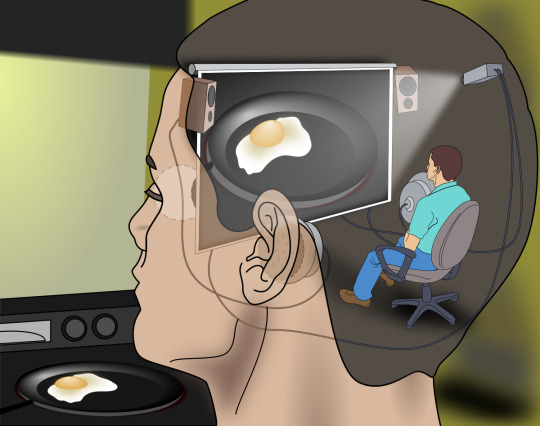
In metaphysics, ontology is the philosophical study of being, as well as related concepts such as existence, becoming, and reality.
341 notes
·
View notes
Quote
I always reason from existence, not toward existence, whether I move in the sphere of palpable sensible fact or in the realm of thought. I do not for example prove that a stone exists, but that some existing thing is a stone. The procedure in a court of justice does not prove that a criminal exists, but that the accused, whose existence is given, is a criminal.
Søren Kierkegaard, Philosophical Fragments
123 notes
·
View notes
Text
Derealization. A world’s externality is characterized by no one but the individual who resides in it. The suppressed perception that one’s surrounding is non-existent. A fact we must lay and accept with undeniable certainty. While those who withstand the coercion, those who cognize the facet of reality are able to comprehend the fact that our comprehension can only go so far. Actuality does not equal materiality. Our perceptible reality is none but fictitious, realism lies beneath the pith of your eternalness. Beneath the soul. Thousands swarm you, yet you continue to move. The postulation of the many discrepancies that force abstractions into fact. Empiricism leads all. But never mind that, you are supposed to be your own guide. People lead themselves with unwavering attentiveness, though you somehow are incapable of freeing yourself from this incapacitated state of feeling incognizant of your surroundings. You are current, as all is distorted; you are whole. You are everything and the only thing authentic.
wanderlust
#cyberspace#existentialism#reality#ontology#goodnight#writing#writers and poets#writerscommunity#writers on tumblr#poetry#storytelling#philosophy#author#behind the curtain
328 notes
·
View notes
Text
To Be | Director: John Weldon
Studio: National Film Board of Canada | CA, 1990
#Cloning#Ethics#Animation#John Weldon#NFB#Ontology#Philosophical#Canada#Short Film#Being#Teleportation
72 notes
·
View notes
Text
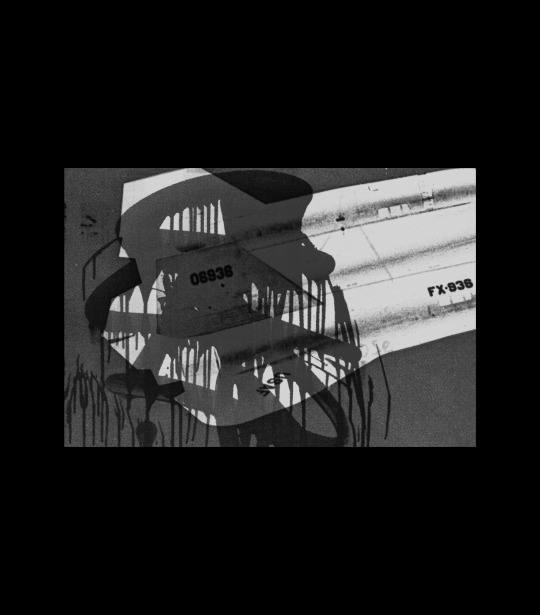
Once an exclusive principle takes over the whole, and denies the legitimacy of anything outside its own architecture, then reality is in peril
#art#retrofuture#design#collage#aesthetic#black and white#handstyle#aircraft#magic#technic#ontology#drip#free palestine
45 notes
·
View notes
Text

#action#clarity#momentum#growth#start now#self help#aesthetic#vintage#style#beauty#ontology#progress
40 notes
·
View notes
Text
Furthermore, the very attempt to define how a philosophical work is supposed to be connected with other efforts to deal with the same subject-matter drags in an extraneous concern, and what is really important for the cognition of the truth is obscured. The more conventional opinion gets fixated on the antithesis of truth and falsity, the more it tends to expect a given philosophical system to be either accepted or contradicted; and hence it finds only acceptance or rejection. It does not comprehend the diversity of philosophical systems as the progressive unfolding of truth, but rather sees in it simple disagreements. The bud disappears in the bursting-forth of the blossom, and one might say that the former is refuted by the latter; similarly, when the fruit appears, the blossom is shown up in its turn as a false manifestation of the plant, and the fruit now emerges as the truth of it instead. These forms are not just distinguished from one another, they also supplant one another as mutually incompatible. Yet at the same time their fluid nature makes them moments of an organic unity in which they not only do not conflict, but in which each is as necessary as the other; and this mutual necessity alone constitutes the life of the whole. But he who rejects a philosophical system [i.e. the new philosopher] does not usually comprehend what he is doing in this way; and he who grasps the contradiction between them [i.e, the historian of philosophy] does not, as a general rule, know how to free it from its one-sidedness, or maintain it in its freedom by recognizing the reciprocally necessary moments that take shape as a conflict and seeming incompatibility.
Georg Wilhelm Friedrich Hegel, The Phenomenology of Spirit (Phänomenologie des Geistes), translated by A. V. Miller
#quote#Georg Wilhelm Friedrich Hegel#Hegel#philosophy#The Phenomenology of Spirit#Phenomenology of Spirit#phenomenology#The Phenomenology of Mind#metaphysics#ontology#systems#wholeness#unity#nature
64 notes
·
View notes
Text




The ghostly reflections of tree branches mirrored in puddles.
(Or: when thawing snow turns the world into a looking glass.)
It took me extra long to walk to the Black Power Studies seminar today. Perambulating down Oxford Street, I was distracted by every image I saw reflected in the puddles—the sun behind the clouds, the buildings, the power lines, the birds, the gloomy sky. While I was staring at a puddle I was shaken by the sudden THUD of a pedestrian getting hit by a gold minivan. The pedestrian seemed okay, but that unsettling feeling that life can end at any moment stayed with me throughout the day.
Strangely, Virginia Woolf had a lot to say about puddles and mortality. Some quotes:
Some cleavage of the dark there must have been, some channel in the depths of obscurity through which light enough issued […]. The mystic, the visionary, walking the beach on a fine night, stirring a puddle, looking at a stone, asking themselves “What am I,” “What is this?” […].
—To the Lighthouse (1927)
“There is the puddle,” said Rhoda, “and I cannot cross it. I hear the rush of the great grindstone within an inch of my head. Its wind roars in my face. All palpable forms of life have failed me. Unless I can stretch and touch something hard, I shall be blown down the eternal corridors for ever.”
— The Waves (1931)
There was the moment of the puddle in the path; when for no reason I could discover, everything suddenly became unreal; I was suspended; I could not step across the puddle; I tried to touch something . . . the whole world became unreal.
— “A Sketch of the Past” (1939)
.
.
The sudden dissolution of the world, of the self. That’s the horror of the puddle that cannot be crossed, the puddle that augurs madness.
I swear I remember reading about the puddle-grindstone passage in Woolf’s diary, which was absorbed into her novel The Waves. In my vague memory it was connected to news from (Ethel Smyth?) about someone’s suicide. Someone named Carrie, or Caroline, I swear there was an incident that sent Woolf spiraling. An adult incident, a repetition of the dissociative puddle incident from her childhood. But now I cannot find it. Or maybe it was connected to news from Vita, I don’t know. Or maybe the news of the mutual friend’s suicide and the fear of crossing the puddle were falsely fused in my mind by the intensity of my fixations. I had filed the detail away in a dusty drawer of my brain because of the suicided Carrie I knew, the one mirrored everywhere in Woolf’s work. Water suicides. I keep thinking they reveal: there is no ontology. Only God has being, as the Sufi metaphysicians say (and strikingly, the Ocean is the proverbial metaphor for union with God in Sufi poetry, for the only way to stop a drop from drying up is to throw it in the ocean).
#literature#viriginia woolf#Woolf#the waves#to the lighthouse#puddles#water#trees#waters of oblivion#oceanic feeling#ontology#sufi metaphysics#sufism
27 notes
·
View notes
Text
Mindfulness Moment
It may be surprising to be able to pull a powerful philosophical moment/insight from within a Marvel movie… but it’s awesome that this was the level of care and intent brought to the writing here! (Spoiler warning for Guardians of the Galaxy Vol 3)
“There are the hands that made us, and then there are the hands that guide the hands.
My Beloved Racoon. The story’s been yours all along, you just didn’t know it.”
– Lylla
This is such a powerful and moving inflection point for Rocket. Until this moment of luminosity, he was allowing himself to be defined by the High Evolutionary. His whole life, his whole existence, his very sense of self, all of it was being hemmed in by what the HE had said (and done).
More than said, really… for the young Rocket, it was what the HE had decreed. Right before Lylla provides him with this key, Rocket even protests the notion that he could have any purpose in life other than what the HE had declared. The H.E. stated X, that was the truth, and Rocket could, therefore, be no more than that.
But in the space she created by granting Rocket absolution for her (and Teefs and Floor’s death), Lylla provides Rocket with the true key that releases him from his cage. In Rocket’s past there is tragedy. There is pain. And there is callous cruelty by his caretaker. But he doesn’t need to be defined by that. He doesn’t need to be defined by the HE, or the HE’s intentions, or the HE’s actions. He doesn’t need to be defined by any of that.
It is his story. He gets to write it. He gets to choose.
In that moment, Rocket gains freedom. Freedom to let go of the guilt he’s been carrying, freedom from the constraints he let the past and the HE impose on him, and, ultimately, the freedom to be. And with that he may move forward into the future, creating as he goes, and free once more to express the authentic love and heart he has for others.
* As I mentioned before, it’s also a great culmination of Rocket’s arc told throughout his MCU appearances.
** I’ve seen some chatter that poo pooed Lyla’s second line about it being Rocket’s story as some sort of smirking hint by the director on how all the movies have really been about Rocket (and not Quill, etc). Which, on a secondary level, it might well be. But I think it erroneous to divorce it from the whole of Lyla’s dialogue and not see it as a continuation of the hands line that comes before it.
#mindfulness#philosophy#ontology#possibility#marvel#guardians of the galaxy#rocket raccoon#lylla#gotg vol 3
77 notes
·
View notes
Text
To exist is to change, to change is to mature, to mature is to go on creating oneself endlessly.
Henri Bergson, Matter And Memory.
#philosophy tumblr#philoblr#french philosophy#french author#sorbonne#philosopher#henri bergson#metaphysics#phenomenology#ontology#transcendentalism#dark academia#life quotes
24 notes
·
View notes
Text
Ti Platonism
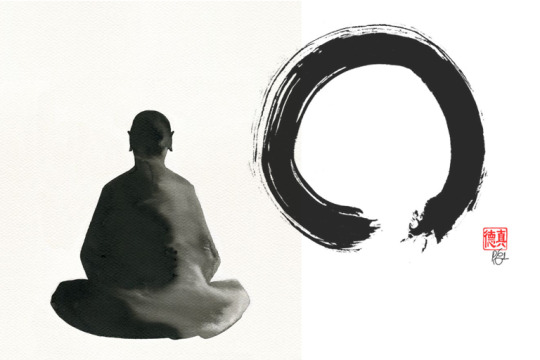
Search for Universal Axioms
While it might be said that all types seek truth of a sort, to the Ti user the quest for truth has a very specific meaning. He is not satisfied with the acquisition of information and indeed he generally avoids information, but is instead drawn to eternally narrow his search down to what he believes is the core of a thing - beyond the senses and beyond the confines of space or time. He'll aim to get rid of as much as is unnecessary, until only the essence remains. To him, truth means landing upon some elusive and singular convergent principle or nexus which gives formulation, symmetry and justification to everything else in the conscious universe. The Ti user, it may be said, is on a quest for a philosopher's stone. He will dig for it in all manner of philosophy and theories of the mind and this can cause them to become obsessive in their pursuits, and abandon all sense of context in their research. They may forget that they are not making tangible progress towards any scientific or objective aim, but instead are diving headlong into a conceptual challenge. Indeed it is an epistemological challenge with the bait of the One Truth at the end of it which they chase. And whether this truth is ever known by the Ti user is irrelevant to the visceral belief in its existence. Even if he has come to doubt all truth and has entered an existential dead end in his pursuit, so that he only knows that he knows almost nothing, he was lead into this territory by an inarticulated but deep rooted suspicion that something is there just waiting to be crystallized into knowledge.
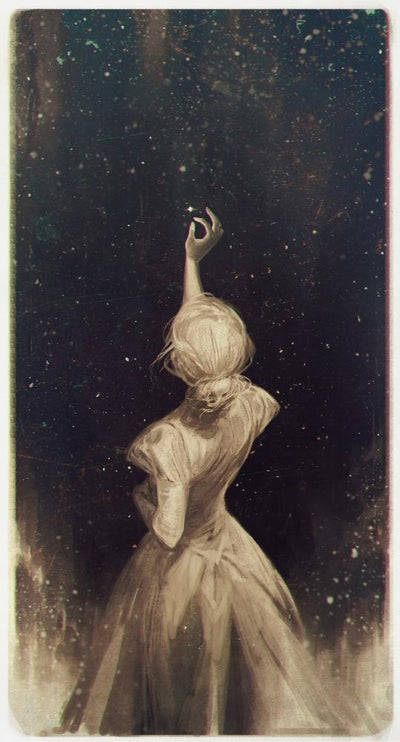
Reductionism
For the Ti user the world is often seen as a place of incongruences and complexities; of paradoxes and mysteries. Everything is operating from unchecked assumptions on top of assumptions with no explanation given for why any such thing is to be believed. The world seems utterly chaotic and nonsensical, and this causes a great deal of stress especially as it relates to the pursuit of axiomatic truth. In order to alleviate this, Ti often executes a reductionist methodology wherein all unjustified things are negated, in an effort to eliminate all untruths and see what is left. Ti in its purest sense will not wish to adapt any form of knowledge or information if it does not understand its underlying formation. It will feel that if the starting premise within them is not correct, then the entire foundation is faulty and all else that can be built from it will be askew. It therefore obsesses over the accuracy of the first few blocks and cornerstones of its epistemology, forcing Ti often times into an infinite regression loop of doubt. If told "go to school" then may think "what is school" and from there proceed to ask "what is a degree?" and "what makes knowledge gained at a school desk more valid than what is self-taught?" This can be terribly frustrating to family members as it may appear that the Ti user is rationalizing his way out of responsibility, when in reality he is contending with the existential questions of meaning, value and purpose - which often must be addressed for them first before a single finger can be lifted towards a task. This can be problematic as Ti will tend to reduce social norms/ideas/things down to parts, without putting them back together. These thoughts will occupy the Ti user's mind continually and may cause things to lose their value as the process of reduction strips away all meaning. At its most extreme this can lead to to existential dilemmas and nihilism even when nothing in life would suggest a reason to be unhappy. As Ti is a subtractive process by nature, it acts as a diagnostic process that identifies misalignment in any system of premises. Hence it tends to be far better at identifying what things are not, than what things are. It is often up to the other functions to counterbalance Ti's influence and provide positive affirmation for reasons, motivations and purposes.

Castle Construction
However, if enough of a theoretical foundation has been set in the mind of the Ti user, then what emerges is a crystalline structure at the core of their being. Like the growth of an ice crystal from water, a theoretical castle begins to form. Each block of this castle is a premise or argument that helps structure the incoming information of reality in such a way as to create an interpretive scaffold. For Ti, this scaffold serves as a sort of Rubik's cube or kaleidoscope that allows the complexities of life to be viewed and understood from a convergent point. Should there ever be a mismatch between the reality outside of them and the kaleidoscope's prediction, the Ti user hurries to try to reformulate and refine their instrument (to fix the Rubik's cube), but an instrument they must use. The Ti user does not interface with reality directly, but does so through this instrument which acts as their proxy and go-between and allows them to make sense of things without needing necessarily to engage in the difficult task of materialism or empiricism. This leads inescapably to the formation of a personal theory, often beginning with phenomenology of the mind/consciousness. One such example of a crystalline theoretical structure is René Descartes' "cogito ergo sum" which, through his efforts and thoughts, was the cornerstone he came to develop and which helped him make sense of all other premises that cascade from this first axiom. But each Ti user may place a different conclusion as their starting premise. For some, the fundamental principle may be consciousness, for others it may be bodily experience, and for others it may be God or love.

Ontology & Linguistics
The Ti function is inherently philosophical in nature, producing in the Ti user a gravitation towards what we might call ontology. It becomes important to the Ti user to define what things are in and of themselves. In this sense, Ti seeks to describe reality absolutely and almost as though they were to vanish themselves from existence. It must be able to be true without them in the picture, otherwise it is not true. By this metric Ti seeks for a sort of timeless abstract definition for everything. The Ti user usually seeks to encapsulate the essence of a thing through semantic precision; meticulously working out where the boundaries lie between two adjacent thought groupings. There is little more satisfying to them than when data suddenly clicks into perfect arrangement, revealing a fundamental truth. The Ti user lives for these rare and magic moments of clarity and by engaging in this differentiation process, they gain a firm mental grasp on the world; dissipating the fog of the unknown. The further the Ti user is from clarity of definition in his own thoughts, the more internal dissonance will be felt. This can also make the Ti user a bit of a grammar nazi and their semantic proclivities can lead them to spend hours discussing starting terms without ever making headway related to the real-world problem in question. The Ti user may be highly stimulated by such a discourse even though the original point of the discussion has been left far in the past. More than a few Ti users thus take to linguistics for their proximity to philosophy and their capacity to organize the very structure of our knowledge paradigms.
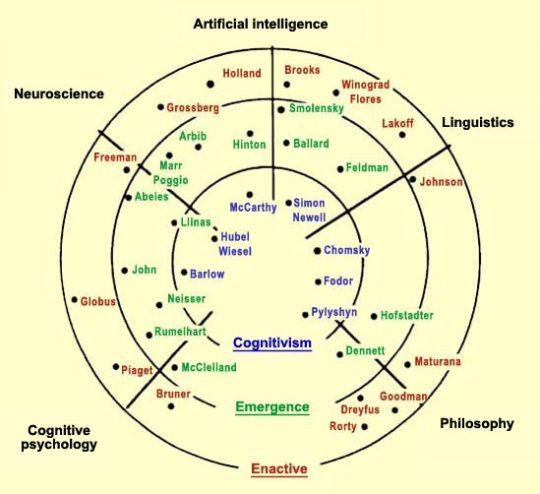
Perfectionism
Additionally, there is a perfectionist quality to the Ti user wherein their personal desire for purity of logos is at once a desire for purity of the self. Indeed, the Ti user's success in building this logic framework is tied to their sense of identity, as they may view themselves primarily as a truth-seeker and truth-speakers. There will be an ethical quality to their pursuit which manifests in a valuing of neutrality, honesty, authenticity and clarity. Lack of neutrality, honesty or lack of clarity will be sensed as a transgression; one which they avoid in their own behavior and which they may also depreciate in others. As a compass function, Ti will strive for a type of nobility of character which it can sustain only if it feels it is being honest with itself and avoiding as many impurities as possible in its own thinking. This high personal standard can cause the Ti user to become entirely mute as their ignorance forces them to retract any opinion or utterance that they cannot firmly stand behind. The strong Ti user may be a very silent presence at school or in the workforce, speaking only occasionally and after minutes or hours of reflection on what he wishes to say. If their logical devotion is towards an art project or creative endeavor, the same bottleneck may appear, causing them to hesitate in publishing any works until everything feels entirely perfect. They may feel their works are never quite precise enough and will spend countless hours in the refinement process - aiming always for their writings, paintings or manifestations to capture their thoughts and intentions with no compromise. This can lead to negative feelings and self-blame forming for mistakes made or inaccurate information given.

Stubborn Alignment to Framework
While the Ti user may not know many things, he will stand firm by what he does know. The Ti user can be stubborn and difficult to negotiate with if they have fixated on certain ideas they feel are true, and so long as their idea remains in their head, their heels remain sunk in that interpretation. This can lead them to become impractical in many real-world situations when the consequences of their carefully crafted definitions collide with certain necessary actions and obligations. They’ll often refuse to participate in something that seems necessary to some, but misaligned to them. And while no amount of pressure, external circumstance or logistical necessities can bend their opinion, a properly aimed rebuttal can radically shift their entire stance in moments. The Ti user's logical apparatus operates like a lock combination. When the right inputs (deductions) are received, suddenly the gates of their thoughts reconfigure and allow for a completely new mental trajectory to be possible and new actions to emerge from them. But without this reconfiguration, they may remain deadlocked in certain conclusions or philosophies even when those conclusions are negative and harmful to them. The strong Ti user must reason his way out of a certain conceptual hole and cannot simply ignore it or choose a more convenient path which doesn't fit into the structure and rules of their self-made castle.

-Behaviors Under Stress
Emotional Shutoff
When the stress and gravity of life cause a fall out of emotional health, the strong Ti user's already faint emotional energies become even more deeply coveted. Unable to operate meaningfully in the environment, they will flee fully from the world and into a protective barrier of their own making. They will shut off emotionally and may become suspicious and avoidant of intrusions to their private space. This can lead to a very isolated experience where they feel they can only rely on themselves to figure out the answers to emotional problems which it often treats as intellectual problems. Driven equally by feelings of self-sufficiency and fear of emotional openness, they will aim to shoulder their pain entirely alone.
They will meet the problem with callousness of feeling. What is not felt cannot hurt, and here their natural capacity for dispassion is repurposed and used to strip power away from the heart. They may sever their connection to others with surprising ease, and forget the magnitude of their inner affect. What is non-ideal is rejected as they continue their pursuit for the ideal both in themselves and others. Yet the content remains present but buried in the unconscious, and they may harbor unresolved feelings for years at a time – often freezing their heart in the process. Merciless as they may be, they will intellectualize their decisions, satisfying their need to act from just premises and retain a proper sense of self.
Wailings and charged emotional reactions may be perceived as irrational and therefore inappropriate and to be avoided. However, as stress accumulates further, their logic will become gradually more distorted as they aim to rationalize what is essentially an emotional objection underneath. Unable to clearly and cathartically convey their heart’s voice, having stripped it of its power, their inner pains will emerge through distorted logical arguments and skewed claims. Their tendency to intellectualize matters of the heart will lead them to push the narrative into a form that aligns with their repressed feelings. As their stress furthers, they may disconnect themselves from others entirely and fall into schizoid tendencies.

Hyper-Focus on Imperfections
In another scenario, if the Ti user's heart remains open, they meet the problem with honesty of feeling. In their pursuit for authenticity of self, they allow the full gravity of their situation to hit them and they familiarize themselves with their darkest disappointments, losses and despair. Because they are perfectionists by nature, they will turn their attention to themselves to understand what is wrong. They may come to feel responsible for all that is not going well in their life and will be prone to episodes of melancholy and deep ruminations about their shortcomings. Worse yet, if a conclusion emerges (“I’m horrible”, “I’m responsible”) that cannot be rationally refuted, be it true or not, they will need to continue believing it in order not to betray their compass, even if believing such a thing causes continual pain. Moving past certain damages can be challenging unless their paradigm changes to reinterpret their past in a way that puts them in a more merciful place. They will have trouble accepting positive emotions just for the sake of it, without cause to feel positive. They will feel dubious of any trajectory of healing that isn’t somehow also justified in a certain sense. In this way, they do themselves no service; holding onto their negative beliefs so adamantly can be the cause of their own demise.

#Cognitive Typology#Cognitive Functions#Introverted Thinking#Ti#INTP#ISTP#Behaviorism#Platonism#Search for Universal Axioms#Reductionism#Castle Construction#Ontology#Linguistics#Perfectionism#Stubborn Alignment to Framework#Emotional Shutoff#Hyper-Focus on Imperfections#Void
57 notes
·
View notes
Quote
Discussions of the way in which truth is correspondence to reality float free of discussions of what there is in heaven and earth. No roads lead from the project of giving truth-conditions for the sentences of English (English as it is spoken, containing all sorts of theories about all sorts of things) to criteria for theory-choice or to the construction of a canonical notation which "limns the true and ultimate structure of reality." Correspondence, for Davidson, is a relation which has no ontological preferences — it can tie any sort of word to any sort of thing. This neutrality is an expression of the fact that, in a Davidsonian view, nature has no preferred way of being represented, and thus no interest in a canonical notation. Nor can nature be corresponded to better or worse, save in the simple sense that we can have more or fewer true beliefs.
Richard Rorty, Philosophy and the Mirror of Nature
#philosophy#quotes#Richard Rorty#Philosophy and the Mirror of Nature#truth#correspondence#reality#language#representation#theory#ontology#metaphysics
26 notes
·
View notes
Text
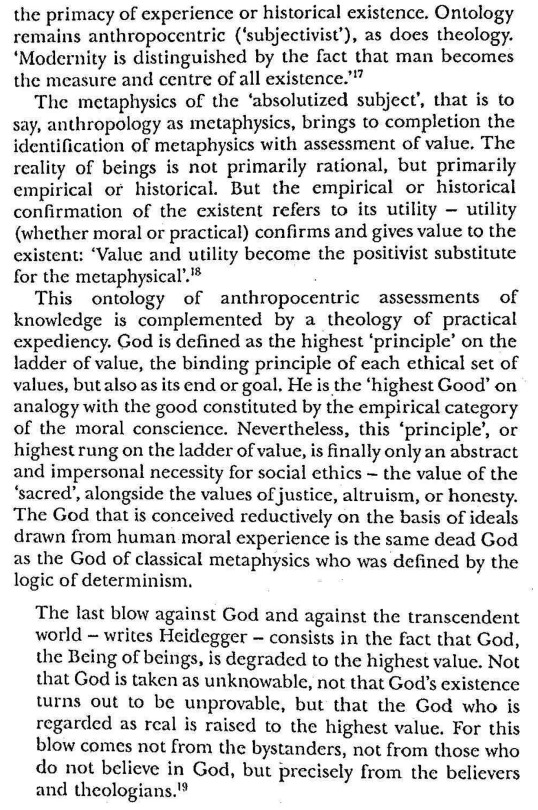
On the Absence and Unknowability of God
C. Yannaras
#yannaras#christianity#hegel#rationality#value#utility#heidegger#empirical#logical#ontology#theory#theology#philosophy
27 notes
·
View notes
Text
The ontological opposite of a femme fatale is a nonlethal bear.
20 notes
·
View notes
Text
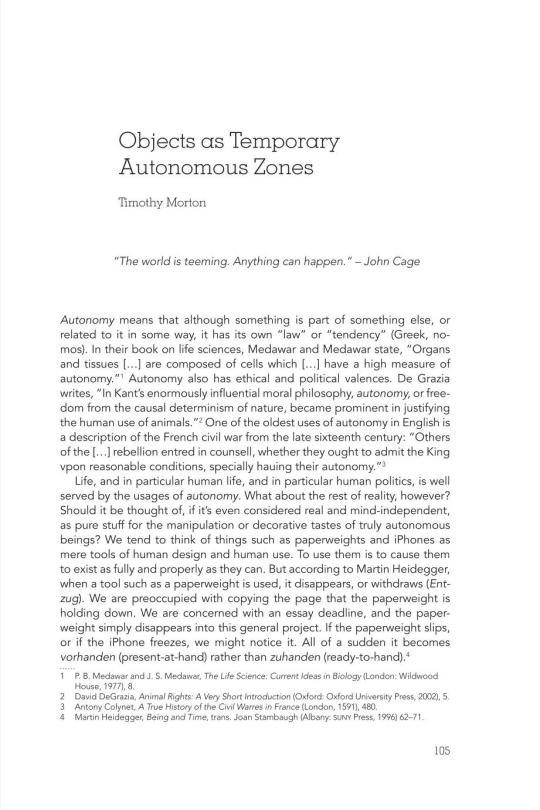
Continent. Year 1: A Selection of Issues 1.1–1.4 : Jamie Allen : Free Download, Borrow, and Streaming : Internet Archive
10 notes
·
View notes